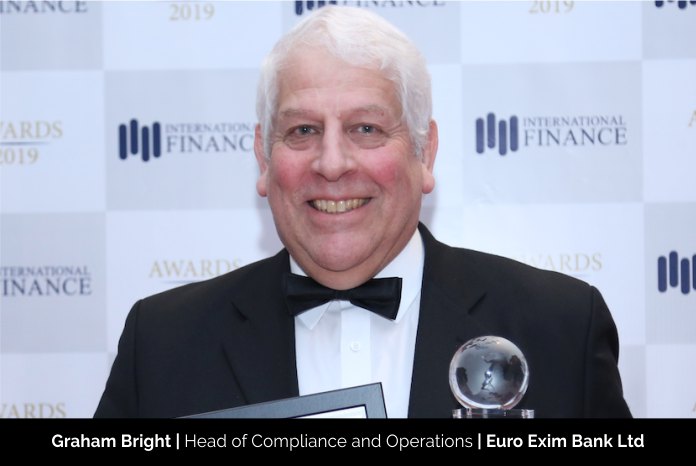Euro Exim Bank: Accelerating Clients’ Import & Export Business Transactions Efficiently
The 10 Best Financial Solution Providers in 2020

Until the Covid-19 outbreak, trade volumes and values were
growing significantly, aided by more cohesiveness and standards in regulation,
compliance, free trade agreements, and a general interest to get deals done.
Conferences and thought leadership articles noted a positive outlook for the
industry. However, in the space of a few weeks, the world has changed. The
retail sector has for the most part shut down. With people isolated at home,
and workers furloughed, remaining viable in retail businesses, with little or
no cashflow has already become unsustainable for many small companies, with
larger enterprises struggling also.
Demand for goods, especially luxury items has plummeted. Car
sales and production have dropped 40%, along with the need for fuel and associated
goods. And who needs insurance if your
car is off the road? And the outlook is no better in travel. The airlines and
support services for our once vibrant travel industry have zero work. The
domino economic effects of the virus are being felt by small suppliers, through
local market sectors up to national level. The tragic worldwide consequences of
Covid-19 have meant an unprecedented change in how we interact and work and how
vital trade may look in future.
In these uncertain times with often contradictory advice,
the role of a financial institution becomes much more vital. Euro
Exim Bank is one such financial solution provider which is leading from
the forefront of this battle and continuing to protect its staff and supporting
the clients to the best of its ability with the tools and resources the firm
has, standing ready to assist in re-building supply chains and trade flows as
we all look forward to healthy, safer, better times to come.
Helping customers’ stay ahead of the game
As a specialist company with a defined number of products
and services, Euro Exim Bank focuses directly on the trade sector. With its
differentiators including trust, leadership, experience, personal
relationships, country expertise, speed of response, cost effective instruments
and above all continued contact and information sharing, the firm attracts a
significant number of companies looking for dedicated services, rather than
working with large institutions where trade products and expertise are a small
often insignificant subset of wide ranging retail banking offerings.
EEB provides the financial instruments facilitating trade
for importers such as Letters of Credit and Standby Letters of Credit providing
rapid processing of documentation with minimum time on paperwork. Furthermore,
EEB provides Bank Guarantee for Contractors. For those who need a guarantee to
bid and win big budget tenders, EEB is authorized to issue Bid Bonds, Tender
Guarantees and Retention Guarantees. The bank also provides Advance Payment
Guarantee and Performance Bank Guarantees for exporters who need specific
instruments to guarantee trades.
Additionally, the bank has Online Bank Accounts with 24×7
availability, operation from anywhere in the world as a corporate or personal
savings account, providing safe banking facilities. Last but not the least, EEB
has Merchant Bank Accounts for buyers and sellers who operate across the globe
with account facilities to accept online payments, using any type of card, with
low rates, safe and secure transactions.
Creating a quality trade platform
In the financial sector, the success of EEB is built on
finding, servicing and retaining sustainable clients, delivering trusted
products through professional specialist staff, with innovative and low-risk solutions
that free-up client cashflow for effective trading. Other differentiators
include, trust, leadership, experience, personal relationships, country
expertise, speed of response, cost effective instruments and above all
continued contact and information sharing. Their clients operate in many
countries where there is huge trade demand, but access to fiat currency,
knowledge of complex processes, and lack of investment in infrastructure hamper
them from being competitive and agile.
EEB’s IT team has shown
ingenuity, latest technologies, flexibility, speed and expertise in creating a
quality trade platform, ultimately allowing the bank to maintain and fully
control risk profiles, future-proofed with blockchain, AI and automated
processes and handling digitizing, store and management of trade documentation.
The system covers the entire lifecycle of trades, from first proforma invoice
from the seller, to settlement of the transaction up to one year later.
Additionally, in partnership with RippleNet, EEB has implemented innovative
Ripple payment services, enabling settlement of cross border transactions using
XRP cryptocurrency. This is more cost effective than traditional international
wire transfers and much faster; virtually instantaneous vs. 3-5 business days.
“We achieve this through Ripple xCurrent and On-Demand
Liquidity (ODL) which facilitate frictionless, real-time direct financial
exchange. The former directs cross-border payments into customer accounts
without correspondent bank relationships or currency fluctuation. The latter
minimizes liquidity costs, reducing cash flow issues, using XRP as the
underlying digital asset, rather than switching into more expensive often
restricted fiat currencies. The EEB approach, designed to mitigate risk remains
dependent on strong KYC and indemnity processes. In these challenging times, we
are a major differentiator in providing clients appropriate collateral
requirements to trade more competitively and efficiently, placing them ahead of
cash-strapped competitors,” asserts Graham Bright, Head of Compliance and
Operations at Euro Exim Bank.
Eyeing towards a hopeful tomorrow
Graham believes clients have increasingly demanded fast
navigation through the compliance process, rapid creation of instruments to
support often complex trades and our role relies on assessing the means,
ability and intent of buyers to pay, and to fulfill their obligations through
the trade life cycle. They have also requested fast instrument issuance,
offering flexible terms and cost-effective rates allowing them to make profit
and to repeat business. “Whilst we will see inevitable changes in the volume of
trade and the rebuilding of supply links as the effects of global lockdowns and
production stoppages begin to reverse, certainty of transactions and settlement
remain the key issues for buyers and sellers. In reality, the requirements have
not changed. The basic issuance of an instrument is designed to protect all
parties, and the financial arrangements that accompany every trade are still in
place as before. The short term position
will likely be a reduced volume and value of trades, kept at lower levels as
industries restart their production lines as staff and materials return to
pre-COVID-19 levels. Buying habits, and demand in general has fundamentally
changed. Only after a sustained period with deep focus on what customers need
rather than what they want, will economies see the rise of output,
re-employment and goods starting to move seamlessly again,” Graham adds.
Changing the way finance and account stress is handled
Talking about current economic situation owing to lockdown,
Graham says what difference a few months can make. With approximately 20000
banks worldwide, plus credit unions and licensed institutions, the experience
of the recent coronavirus lockdown, social distancing and home banking is
completely changing the way finance and account access is handled. He says maintaining
costly infrastructure has already changed the look of high streets, and current
sentiment and isolation will define which stores can adapt and succeed long
term, as banks will see a marked shift with significant reduction in footfall,
multiple branches and cash to a more favored online, mobile electronic banking
environment. High street banks will struggle to survive in their current form
and we anticipate more mergers and tightening of the services on offer.
Graham suggests that the key is to open more digital
channels in retail banking with bots and intelligent applications handling
routine simple enquiries in order to take the major workload from the
traditional call centers. “Ultimately less people working smarter supporting
the user base, and more intelligent systems & delivery mechanisms
supporting more technology savvy customers.” Another major factor is to improve
client experience in transaction banking while also improving security, market
access and internal capabilities, as banks specialize whilst embracing greater
digitalization of documents and process.
As a wholesale business, EEB is unencumbered by the
requirements, costs and overheads that retail branches must sustain, in
maintaining ATM networks, ‘bricks and mortar’ buildings and large IT divisions
working on projects that require global rollout. Graham and the team are fully
focused on trade, mitigation of risk, building their customer base and
reputation as prime provider of financial instruments. EEB’s mission is to help
corporates in the process of importing goods from around the world. The
ecosystem of trade with all its players and the complexity of regulation and
documentation makes trade difficult for smaller inexperienced companies in
often challenging jurisdictions. “We
remove that burden and provide comprehensive, competitive and compelling
services with apt collateral requirements using our digital platforms,
blockchain enabled applications and years of experience, ultimately
facilitating global trade. Our vision is to expand our sales teams, geographic
reach and market attractiveness making us the pre-eminent provider of trade
instruments globally,” Graham affirms.
To remain a trusted sustainable business
EEB’s growth is planned, measured and exciting. From 2015,
with 3 staff to over 40 worldwide, high levels of gender diversity, steady
revenue increase from targeted services, value of the instruments EEB has been
approached to issue over the years in excess of 3 trillion dollars, geographic
expansion, new offices and special projects. EEB takes a pragmatic approach of
cautious, careful investment and agile management to ensure healthy revenue and
profit growth. Graham says the bank’s goal is to remain a trusted sustainable
business and well-established employer, leading the field in the finance
sector, building reputation with international recognition, though leadership,
a broad skill base, with strong management and financial performance.
Moving ahead, EEB’s plans include rapid sales team growth,
more country coverage, technical enhancements to speed up instrument issuance
processes, and accessing more clients in opportunistic emerging markets. “We
are continually hearing of challenging barriers to trade for clients, left
without cost-effective access to fiat currency, with no access to loans and
instrument issuance services, as major banks pull out of trade services and
even leave the local market. Euro Exim Bank is well positioned and ready to
work with smaller currently disadvantaged companies, finding trade initiation
solutions enabling them to rightfully and economically compete in the wider
international arena,” Graham further adds.
Meet the maestro
Graham studied Business and Law at University, and when
completing his degree, he worked in a US partner company of Unilever
specializing in computer timesharing applications. Initially, he worked on
medical systems clinical trials analysis (designing and computerizing drug
trials and running advanced statistics) and subsequently financial systems.
Graham says his career path since 1983 has been aligned to financial services.
Three years at Control Data in credit analysis applications, banking and
treasury systems was followed by 20 years at SWIFT in sales and partner
solutions, culminating with working with application vendors and market
infrastructures such as The Bank of England on RTGS projects. Subsequently, he
was MD at the technology subsidiary of a French Bank for 5 years, EMEA SME on
Investment Management and international banking at EMC, and after a period of
consulting, at Euro Exim Bank for more than five years. “My career has spanned
the financial sector from payments, funds, FX, Securities, trade, nostro
reconciliation, RTGS, and partner management working with and accrediting
vendor applications.”
At EEB, Graham’s primary role is to keep the bank safe by
negating and mitigating risk in the bank’s processes, software and client
activity. The role involves meeting with clients, regulators, applying local,
national and international rules, mandates and recommendations. Of high
priority is adherence to the firm’s code of conduct and ethics, and working
with sales teams to ensure repeat business. He also engages with IT in reviewing KYC, AML, due diligence, KYE
software for customer onboarding. “Also, we strive to keep ourselves current
with the implications of sanctions, adverse press, PEPs and criminal
judgements, looking at identity assurance, financial models, and ever-changing
regulatory rules and geopolitical influences across the multiple diverse
jurisdictions in which we operate.”
“With regulation somewhere in the world changing every minute, it is a wide ranging and fascinating role, where every day is different, presenting challenges, opportunities and requirements to work diligently and closely as a team. Whereas many people view compliance and due diligence as barriers to business and always resulting in ‘no’, we work collaboratively as partners with other departments across the company, saying ‘yes’ when proven possible, enabling successful business in an ethical, moral, legally acceptable way, ensuring that all parties are protected for every accepted transaction. I am proud to represent the company, and with our expansion plans feel extremely positive about our roadmap as we navigate complex trades, volume and staff growth,” concludes Graham.












